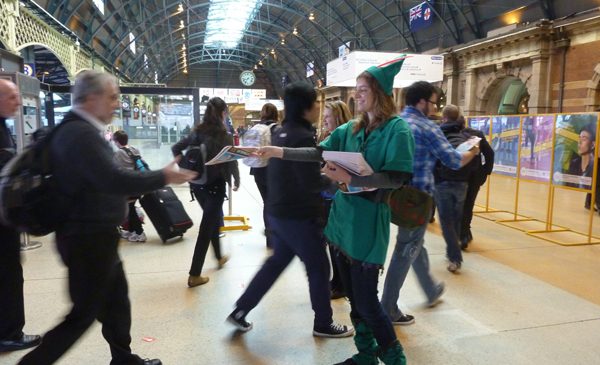
Thousands of Sydneysiders were handed a free newspaper as they got on and off their trains today. No, not THAT free newspaper. This one was a little different.
For one thing, it focused on issues of global poverty. It was also handed out by volunteers, some of whom were dressed as Robin Hood.
This caused a little confusion. Was it Saint Patrick’s Day again already? Was this some new take on gnoming? And wasn’t I too tall to be a pixie? No, no, and well, maybe.
We were dressed in this fashion to promote the idea of a Robin Hood tax: a tiny tax on financial speculation that could raise billions of dollars to combat climate change and poverty. It’s not a new idea, but it’s one that is gaining real momentum in the aftermath of the GFC. Once dismissed as a pipedream, it’s now being promoted by many public figures. Economists Jeffrey Sachs and Joseph Stiglitz support a tax on financial transactions, as do the German Chancellor Angela Merkel, French President Nicolas Sarkozy and former UK Prime Minister Gordon Brown. In Gandhi’s famous words, “first they ignore you, then they laugh at you, then they fight you, then you win”.
It’s a good thing to keep in mind this week as the Making Health Global conference takes place in Melbourne, in the lead up to the UN review of our progress towards the Millenium Development Goals. These are lofty goals, but they don’t have to be unrealistic. While we’ve definitely got a long way to go, there are still ways we could put these goals within our reach. The Robin Hood tax is one such way: it could create a pool of $400 billion globally, and if half of that went towards development and climate change adjustment, making poverty history would not be an impossible dream.
The Make Poverty History newspaper released today includes stories about the Millennium Development Goals and the Robin Hood Tax, a great article by ethicist Peter Singer, a lovely satirical piece about sponsoring Melbournians, and much more. If you weren’t one of the tens of thousands of people across the country who received it today, you can check out an online version here.
By Oxfam intern Giselle Hall.